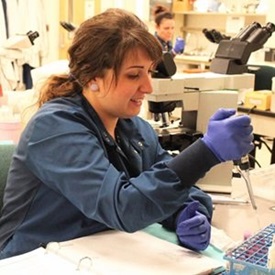
There is a $50 application fee. Tuition is approximately $15,000. There is a non-refundable acceptance fee of $500. Textbooks are approximately $800. Housing and meals are the responsibility of each student. There is no additional charge for out-of-state students. The School of Medical Laboratory Science does not participate in the Federal Student Loan program.
The 12 month track is full-time, in-person, Monday-Friday for one year.
The 18 month track offers a more part-time, hybrid option. The first 16 weeks of the program are full-time, in-person. Clinical rotations are full-time. The remaining terms are part-time.
Most learning experiences occur during the day, Monday-Friday. Shifts can start as early as 5am. Students may be required to rotate on an evening shift, but currently are not rotating on night shift. Students must complete the entire training to graduate and be eligible to take the national certification exam. Please inquire as to the availability of learning tracks prior to applying.
Students who choose to work usually do not work over 10-15 hours per week, and typically work on the weekends. Entry level jobs in the laboratory may be available for student hire depending on regional needs. Tuition reimbursement may be available to current, qualified Providence caregivers.
Clinical rotations are offered in all core disciplines required for generalist training, including chemistry, microbiology, hematology, and blood banking. Clinical rotations are offered at urban, rural and reference laboratories. Depending on regional rotation availability, students may be able to rotate in specialty laboratories such as molecular diagnostics, flow cytometry, special chemistry, advanced coagulation, virology, parasitology and mycology.
Qualified students receive notification of acceptance two months after the application is due.
Interviews must be in person and are required as part of the selection process. Interviews are held two to six weeks after the application is due.
Medical Laboratory Scientists have, at minimum, a bachelor’s degree. Medical Laboratory Technicians have, at minimum, an associate’s degree or technical certificate. Some institutions or states limit the type of testing MLTs can perform. Generally, a MLS performs more highly-complex testing, requiring interpretations and correlation of data, as well as more intense trouble-shooting processes.
For more information on MLT programs operating in Spokane, WA region, please visit the following schools:
No, these are all titles given to scientists who work in medical laboratories. In 2009, the two major national certifying agencies (ASCP and NCA) joined as one under the ASCP Board of Certification, thus combining titles of laboratory scientists/technologists. Now the official title from ASCP is Medical Laboratory Scientist (MLS). In 2012 our school’s name changed to Providence Sacred Heart Medical Center School of Medical Laboratory Science to help mainstream the terminology associated with our profession.
3+1 refers to an applicant who enters a training program and completes their last year of college in a hospital-based MLS program. An affiliation agreement must be established between your university and our MLS program in order for you to enter the program as a 3+1 student. We currently have a 3+1 agreement with Eastern Washington University. 4+1 refers to a student who already has a bachelor’s degree upon entering the hospital-based MLS program.
Since 1928, ASCP (American Society for Clinical Pathology) Board of Certification (BOC) (formerly the ASCP Board of Registry) has been widely recognized as the preeminent leader in the certification of medical laboratory professionals. The majority of employers hire only certified staff.